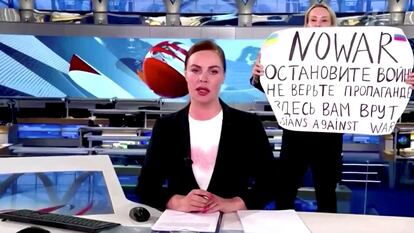Russian journalist who protested war on live newscast flees to Europe
Marina Ovsyannikova, once a state TV editor, was under house arrest for expressing her opposition against the invasion of Ukraine


Marina Ovsyannikova, a Russian state TV editor who protested live against Russia’s war in Ukraine, has fled the country. “She is now under the protection of a European state,” said her lawyer, Dmitry Zakhvatov, in statements to the TV station Sota, without providing any additional details about how or when she crossed the border or about her current location.
The former editor of Pervyi Kanal (Channel 1) became famous in March by crashing a live news broadcast with an anti-war poster. She was later included on the list of Russia’s most wanted people after escaping from house arrest, where she’d been placed following a second protest on July 15 in which she marched in a public square near the Kremlin with a poster reading “Putin is a murderer. His soldiers are fascists.” Under new legislation targeting the spread of false information about the Russian army, Ovsyannikova could have faced up to 10 years in prison.
This is Ovsyannikova’s second escape from Russia. She left for Germany a few weeks after her prime-time protest in March and was hired by a local newspaper, but returned to Russia in early July over a parental custody dispute with her ex-husband. On Monday of this week, a court handed custody of her 11-year-old daughter to her former spouse, who works for the state-owned channel RT and “demands that the children live with him in Moscow,” according to Ovsyannikova’s social media posts. The court said that the little girl “must stay with her father because her mother carries out political activities.” It also ruled that Ovsyannikova must pay child support for both her daughter and 17-year-old son (who said he wants to stay with his father) until they reach the age of majority.
Following her July protest, a Moscow court ordered Ovsyannikova to remain under house arrest until October 9, but the TV editor left her home in late September, as she herself reported on October 5 without revealing her whereabouts. Ovsyannikova had previously said on social media that she would like to go abroad with her daughter. The Prosecutor’s Office is now accusing the journalist of having kidnapped the child and of preventing her from communicating with her father.
“The happiness of the whole world is not worth a tear on the cheek of an innocent child,” the journalist quoted Fyodor Dostoevsky in her last post on Telegram, dated October 5. “I am being persecuted for telling the truth,” she added, before citing UN figures for children killed in the Ukraine conflict.
“I am completely innocent and, since our state refuses to comply with its own laws, as of September 30 I have refused to abide by the precautionary measure of house arrest,” Ovsyannikova concluded in the last message she published.
Tu suscripción se está usando en otro dispositivo
¿Quieres añadir otro usuario a tu suscripción?
Si continúas leyendo en este dispositivo, no se podrá leer en el otro.
FlechaTu suscripción se está usando en otro dispositivo y solo puedes acceder a EL PAÍS desde un dispositivo a la vez.
Si quieres compartir tu cuenta, cambia tu suscripción a la modalidad Premium, así podrás añadir otro usuario. Cada uno accederá con su propia cuenta de email, lo que os permitirá personalizar vuestra experiencia en EL PAÍS.
¿Tienes una suscripción de empresa? Accede aquí para contratar más cuentas.
En el caso de no saber quién está usando tu cuenta, te recomendamos cambiar tu contraseña aquí.
Si decides continuar compartiendo tu cuenta, este mensaje se mostrará en tu dispositivo y en el de la otra persona que está usando tu cuenta de forma indefinida, afectando a tu experiencia de lectura. Puedes consultar aquí los términos y condiciones de la suscripción digital.








































